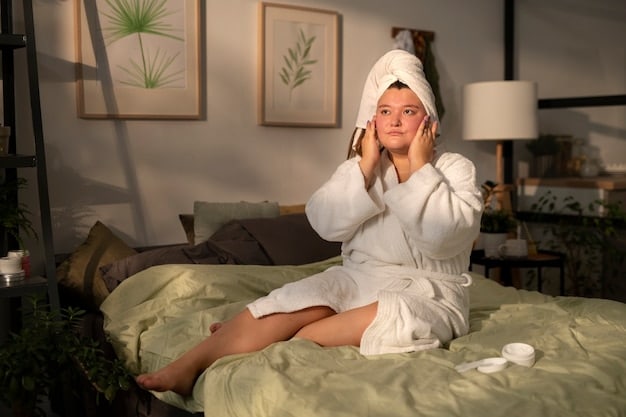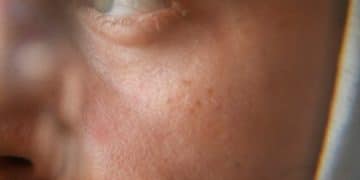Sleep and Skin: How 7-8 Hours Can Transform Your Complexion

Consistent sleep for 7-8 hours is crucial for skin health, allowing cellular repair, collagen production, and hormone regulation, leading to improved elasticity, reduced inflammation, and a more radiant complexion.
The pursuit of radiant, healthy skin often leads us down paths of expensive serums, elaborate routines, and countless beauty hacks. However, one of the most powerful, yet frequently overlooked, tools available for skin transformation lies not in a bottle, but in the realm of rest: sleep. Specifically, consistent The Impact of Sleep on Your Skin: How 7-8 Hours Can Transform Your Complexion extends far beyond merely looking less tired; it deeply influences cellular repair and overall skin vitality.
The Science of Beauty Sleep: Cellular Repair and Regeneration
Understanding how sleep impacts your skin begins at the cellular level. During our waking hours, skin cells are constantly battling environmental aggressors such as UV radiation, pollution, and general wear and tear. Sleep provides a vital window for these cells to undertake critical repair processes.
This repair mechanism is incredibly sophisticated. As you drift into deeper sleep stages, your body boosts the production of growth hormones and triggers various regenerative pathways. These processes are essential for reversing the damage accumulated throughout the day. Without adequate rest, your skin is left to fend for itself, leading to accumulated stress and visible signs of fatigue and aging.
The Role of Human Growth Hormone (HGH)
One of the key players in overnight skin rejuvenation is the Human Growth Hormone (HGH). Secreted during deep, non-REM sleep stages, HGH is not just for growing children; it’s pivotal for adults too. It stimulates cell reproduction and regeneration, which is critical for maintaining healthy skin structure. A consistent lack of sleep can significantly diminish HGH production.
- Cell Turnover: HGH accelerates the rate at which old, damaged skin cells are replaced by new, healthy ones, leading to a fresher complexion.
- Collagen Production: It plays a direct role in synthesizing collagen and elastin, the proteins responsible for skin’s firmness and elasticity.
- Wound Healing: HGH also aids in the repair of micro-injuries and promotes faster healing of blemishes or irritations.
Mitigating Environmental Damage
Beyond internal repair, sleep helps reinforce the skin’s natural barrier. A healthy skin barrier is crucial for protecting against irritants and maintaining hydration. During sleep, blood flow to the skin increases, delivering essential nutrients and oxygen while flushing out toxins. This enhanced circulation supports the barrier’s integrity and boosts overall skin health.
The consistent effort to get 7-8 hours of sleep allows your skin to perform these vital functions uninterrupted. Think of it as your skin’s nightly reset button, providing a comprehensive overhaul. When this reset is missed, the consequences can be seen in a duller complexion, increased sensitivity, and a reduced capacity to recover from daily stresses.
Ultimately, valuing your sleep is equivalent to investing in your skin’s long-term health and resilience. It’s a natural, cost-effective, and highly efficient skincare strategy that works from the inside out, providing a foundation for all other skincare efforts.
Inflammation and Skin Conditions: The Sleep Connection
Chronic inflammation is a silent aggressor for many skin concerns, from acne and eczema to premature aging. Sleep plays a critical role in regulating the body’s inflammatory responses, making it a crucial factor in managing and preventing various inflammatory skin conditions.
When you don’t get enough sleep, your body perceives it as a stressor, triggering an increase in cortisol levels. Cortisol, often known as the “stress hormone,” can exacerbate inflammatory pathways. This hormonal imbalance can, in turn, lead to a flare-up of existing skin conditions or the development of new ones. Achieving the recommended 7-8 hours of sleep allows your body to rebalance these hormones, reducing systemic inflammation.
Acne and Breakouts
For individuals prone to acne, consistent sleep deprivation can be a major trigger. The elevated cortisol levels from lack of sleep stimulate oil glands, leading to an overproduction of sebum. This excess oil, combined with increased inflammation, creates a perfect environment for bacterial growth and clogged pores, manifesting as breakouts. Sufficient sleep helps keep cortisol in check, thus potentially reducing acne severity and frequency.
- Reduced Sebum Production: Balanced hormones from good sleep can help normalize oil production in the skin.
- Less Inflammation: Lower cortisol levels mean less systemic inflammation, reducing redness and swelling associated with acne.
- Improved Healing: As discussed, sleep also enhances the skin’s ability to heal, allowing existing blemishes to resolve more quickly.

Eczema and Psoriasis Management
Chronic inflammatory conditions like eczema and psoriasis are significantly affected by lifestyle factors, with sleep being a considerable one. Lack of sleep can worsen the itch-scratch cycle in eczema patients, as well as trigger flare-ups in psoriasis. Adequate sleep enables the immune system to function optimally, which is vital for managing autoimmune responses that contribute to these conditions. By moderating the inflammatory signals, sleep can help reduce the frequency and intensity of flare-ups, providing much-needed relief.
A consistent sleep schedule allows the body to maintain a stable internal environment, facilitating better management of inflammatory pathways. This stability is crucial for individuals dealing with chronic skin conditions, providing a foundation for topical treatments and other interventions to be more effective. Prioritizing sleep is not just about comfort; it’s a therapeutic component in the holistic management of inflammatory skin disorders.
Thus, integrating sufficient sleep into your daily routine serves as a preventative measure and a therapeutic aid against various inflammatory skin conditions. It underscores the interconnectedness of overall health and skin wellness, emphasizing that true skin health radiates from within.
Collagen and Elastin Production: The Anti-Aging Secret
The quest for youthful, firm skin often leads consumers to products promising to boost collagen and elastin. However, one of the most effective ways to naturally enhance the production of these vital proteins is through consistent, quality sleep. Your skin performs intensive restorative processes during the 7-8 hours you spend in slumber, directly impacting its structural integrity.
Collagen and elastin are the fundamental building blocks that give skin its firmness, elasticity, and smooth appearance. Collagen provides structural support, while elastin allows the skin to stretch and bounce back. As we age, the natural production of these proteins declines, leading to wrinkles, fine lines, and sagging. Sleep is a prime opportunity for the body to counter this decline and fortify the skin’s architecture.
Why Sleep Matters for Collagen Synthesis
During the deep stages of sleep, particularly slow-wave sleep, your body is in an optimal state for repair and regeneration. This is when the production of various growth factors and hormones, including the Human Growth Hormone (HGH), is at its peak. HGH is a powerful stimulant for fibroblasts, the cells responsible for synthesizing collagen and elastin. Without adequate deep sleep, this crucial process is significantly hampered, accelerating the visible signs of aging.
- Enhanced Fibroblast Activity: Sleep maximizes the activity of fibroblasts, ensuring more efficient production of collagen and elastin.
- Optimal Nutrient Delivery: Increased blood flow to the skin during sleep ensures that cells receive the necessary amino acids and other nutrients required for protein synthesis.
- Reduced Protein Degradation: Lower cortisol levels during restful sleep help protect existing collagen and elastin from breakdown, preventing premature aging.
The Impact of Sleep Deprivation
Conversely, chronic sleep deprivation leads to elevated cortisol levels, as mentioned earlier. High cortisol not only impairs collagen production but also actively promotes the breakdown of existing collagen fibers, a process known as collagenase. This dual negative effect significantly compromises skin integrity, leading to a faster appearance of wrinkles, dullness, and loss of firmness. Moreover, lack of sleep diminishes the skin’s ability to repair daily micro-damage, allowing these superficial issues to become permanent over time.
The skin around the eyes often shows the first signs of sleep deprivation, manifesting as dark circles and puffiness due to compromised circulation and fluid retention. Over time, this progresses to more widespread loss of elasticity, making the skin appear less plump and more crepey. Prioritizing 7-8 hours of sleep means allowing your skin to naturally replenish its collagen and elastin reserves, effectively providing a powerful overnight anti-aging treatment that no cream can fully replicate.
In essence, consistent good sleep is an indispensable component of any effective anti-aging strategy. It’s an investment in your skin’s long-term health and youthful appearance, working synergistically with topical products to achieve truly transformative results.
Hydration and Barrier Function: Preventing Dryness and Sensitivity
Skin hydration is a cornerstone of a healthy and radiant complexion. A well-hydrated skin barrier functions optimally, retaining moisture and fending off environmental aggressors. Crucially, the quality and duration of your sleep directly influence your skin’s ability to maintain this essential balance, preventing dryness, dullness, and increased sensitivity.
During the day, various factors like air conditioning, heating, pollution, and sun exposure can dehydrate the skin. Nighttime, particularly during periods of deep sleep, offers a unique opportunity for your skin to replenish its moisture reserves and reinforce its protective barrier. This process is complex, involving several delicate mechanisms.
Trans-Epidermal Water Loss (TEWL)
One of the key concepts here is Trans-Epidermal Water Loss (TEWL). This refers to the natural process where water evaporates from the skin’s surface. While TEWL is a normal physiological process, excessive water loss indicates a compromised skin barrier. Studies suggest that during sleep, particularly deep sleep, the skin’s TEWL can actually be lower than during waking hours, allowing it to retain more moisture. Moreover, cellular repair mechanisms are active, reinforcing the lipid barrier which acts as the skin’s main defense against water loss.
- Enhanced Moisture Retention: A healthy barrier, bolstered by sufficient sleep, effectively locks in hydration.
- Reduced Sensitivity: A robust barrier is less permeable to irritants and allergens, reducing reactivity and redness.
- Improved Skin Texture: Well-hydrated skin appears plumper, smoother, and less prone to fine lines caused by dehydration.
Regulating pH Balance and Blood Flow
Sleep also contributes to maintaining the skin’s optimal pH balance, which is vital for the enzyme activity involved in barrier function. A balanced pH ensures the skin remains slightly acidic, creating an unfriendly environment for harmful bacteria and supporting the skin’s natural microbiome. Additionally, improved blood circulation during sleep delivers more oxygen and nutrients to the skin cells, supporting their metabolic processes and contributing to a healthier, more resilient barrier.
When sleep is insufficient, these crucial processes are disrupted. The skin’s barrier becomes more permeable, leading to increased TEWL and making the skin more susceptible to dryness, flakiness, and irritation. This weakened barrier also means the skin is less capable of defending itself against pollutants and pathogens, potentially leading to breakouts and inflammatory responses. The result is often a dull, coarse, and sensitive complexion that struggles to recover.
Therefore, treating sleep as a non-negotiable part of your skincare routine is paramount for maintaining optimal skin hydration and a robust barrier function. It’s a fundamental aspect of skin health that allows topical hydrators and barrier-repairing ingredients to work more effectively, culminating in skin that feels comfortable, resilient, and radiates natural glow.
Dark Circles and Puffiness: The Visible Signs of Sleep Deprivation
Perhaps the most immediate and undeniable evidence of inadequate sleep shows up right on your face: dark circles and under-eye puffiness. These common concerns are often the first tell-tale signs that you haven’t logged your full 7-8 hours, visually betraying your internal state of fatigue long before you even feel fully awake.
The skin around the eyes is notoriously thin and delicate, making it highly susceptible to showing changes in blood flow, fluid retention, and cellular health. When you’re sleep-deprived, the body’s natural systems for regulating circulation and fluid balance are thrown off, leading to these characteristic cosmetic flaws.
Understanding Dark Circles
Dark circles typically arise from one of two primary issues, both exacerbated by lack of sleep. First, compromised circulation. When you are adequately rested, blood vessels constrict and blood flows smoothly. Insufficient sleep causes blood vessels under the thin eye skin to dilate and become more prominent, allowing blood to pool. Because the skin here is so thin, the bluish tint of the blood vessels becomes highly visible through the skin. Second, dehydration. Lack of sleep can lead to mild dehydration, causing the skin to appear more hollow and the blood vessels even closer to the surface, intensifying the appearance of shadows.
Additionally, sleep deprivation can lower tissue oxygenation. This can cause blood to become slightly deoxygenated, appearing darker through the skin. The cumulative effect is a dull, shadowed look under the eyes that can make you appear older and more tired than you actually are. Restful sleep allows for proper oxygenation and circulation, reducing the prominence of these vascular shadows.
Addressing Under-Eye Puffiness
Puffiness, or periorbital edema, is primarily due to fluid retention. During sleep, your body’s lymphatic system, responsible for draining excess fluids and toxins, works more efficiently. When you don’t get enough sleep, this system can become sluggish. This leads to fluid accumulation around the eyes, where the tissues are looser and more prone to swelling. Lying flat for prolonged periods without the body’s natural fluid drainage mechanisms properly engaged can further exacerbate this pooling. Waking up with swollen, puffy eyes is a direct consequence of this lymphatic stagnation and fluid buildup.
- Enhanced Fluid Drainage: Quality sleep optimizes the lymphatic system, effectively reducing fluid accumulation around the eyes.
- Improved Microcirculation: Proper blood flow prevents blood pooling and dilating vessels, minimizing dark circles.
- Reduced Inflammation: Lower cortisol levels from adequate sleep also contribute to less generalized swelling throughout the face.

Consistently achieving 7-8 hours of restorative sleep allows the delicate skin around your eyes to self-regulate more effectively. It’s a natural and effective way to reduce the appearance of dark circles and puffiness, leading to brighter, more open, and refreshed-looking eyes. While topical creams can offer temporary relief, the long-term solution truly begins with respecting your body’s need for sufficient, quality rest.
The Mind-Skin Connection: Stress, Sleep, and Skin Health
The intricate relationship between the mind and skin is a well-established field, often referred to as psychodermatology. Stress, a pervasive aspect of modern life, directly impacts skin health, and sleep acts as a critical mediator in this connection. Chronic stress can manifest visibly on the skin, and insufficient sleep intensifies this negative feedback loop, making it harder for your skin to maintain its balance and resilience.
When you’re stressed, your body activates its “fight or flight” response, releasing an array of hormones, most notably cortisol. While cortisol is necessary for acute stress responses, chronically elevated levels due to persistent stress—often exacerbated by poor sleep—have detrimental effects on the skin. This includes impairing the skin barrier, increasing inflammation, and accelerating collagen breakdown, leading to a host of problems.
Cortisol and Its Skin Effects
Elevated cortisol levels directly suppress the immune system in the skin, making it more vulnerable to infections and slowing down healing processes. It also stimulates sebaceous glands, leading to increased oil production and a higher likelihood of breakouts. Furthermore, cortisol can trigger a pro-inflammatory cascade, worsening conditions like acne, rosacea, and eczema. This creates a vicious cycle where stress leads to skin issues, which in turn causes more stress, further deteriorating skin health.
Sleep, particularly deep sleep, offers a vital counter-balance to this stress response. It is during these hours that the body naturally lowers cortisol levels and promotes the release of calming neurotransmitters. This allows the skin to recover from the day’s stressors and engage in its intrinsic repair cycles. When you consistently achieve 7-8 hours of quality sleep, you are essentially giving your skin a nightly break from the inflammatory effects of stress, promoting a calmer, clearer complexion.
The Role of Melatonin and Improved Coping
Melatonin, often known as the sleep hormone, is also a powerful antioxidant and anti-inflammatory compound. Its production peaks during darkness, coinciding with your sleep cycle. By promoting adequate sleep, you also support optimal melatonin levels, which can further benefit skin health by neutralizing free radicals and reducing oxidative stress. Moreover, well-rested individuals are generally better equipped to cope with daily stressors. This improved emotional resilience means fewer stress-induced hormonal surges, which directly translates to healthier skin. A calm mind often reflects in a calm complexion.
Therefore, prioritizing quality sleep is not just about physical rest; it’s a profound act of self-care that profoundly impacts your mental and emotional well-being, which in turn reflects on your skin. By managing stress through adequate sleep, you create an internal environment where your skin can thrive, showcasing its natural vitality and health rather than the tell-tale signs of chronic fatigue and anxiety.
Optimizing Your “Beauty Sleep” Routine: Practical Tips
Recognizing the profound impact of 7-8 hours of sleep on your skin is the first step; the next is to actively create an environment and routine that facilitates this restorative rest. Optimizing your “beauty sleep” isn’t just about clocking the right number of hours; it’s about ensuring that sleep is of high quality, allowing your body and skin to fully engage in their nighttime repair processes. Small, consistent changes can yield significant results for your complexion.
A well-structured nightly routine and a conducive sleep environment can significantly enhance your body’s ability to maximize its skin-rejuvenating efforts. Think of this as your personalized strategy to unlock the full potential of your overnight skin transformation, ensuring you wake up with a brighter and healthier complexion.
Setting the Stage for Restorative Sleep
The foundation of good sleep begins with your surroundings and habits leading up to bedtime. Creating a cool, dark, and quiet environment is paramount. Light, especially blue light from screens, can disrupt melatonin production, making it harder to fall and stay asleep. Aim to finish screen time at least an hour before bed. Consider blackout curtains, an eye mask, or earplugs if external light or noise is an issue. The ideal room temperature for sleep generally ranges between 60-67 degrees Fahrenheit (15-19 degrees Celsius), which helps your body naturally cool down, signaling it’s time for rest.
- Consistent Sleep Schedule: Go to bed and wake up at the same time every day, even on weekends, to regulate your body’s natural circadian rhythm.
- Limit Caffeine and Alcohol: Avoid caffeine in the late afternoon and evening, and limit alcohol consumption, especially close to bedtime, as both disrupt sleep architecture.
- Wind-Down Routine: Incorporate calming activities before bed, such as reading, taking a warm bath, or practicing gentle stretching, to signal to your body that it’s time to relax.
Evening Skincare Rituals
While sleep itself is transformative, pairing it with an effective evening skincare ritual can amplify its benefits. Always cleanse your face thoroughly to remove makeup, dirt, and pollutants accumulated during the day. This allows your skin to breathe and absorb active ingredients more efficiently. Applying targeted nighttime treatments like retinoids, antioxidants, or hydrating serums before bed gives these products ample time to work synergistically with your skin’s natural repair cycles. Consider a rich moisturizer to lock in hydration and support the skin barrier overnight.
Additionally, choose bedding materials that are kind to your skin. Silk or satin pillowcases can reduce friction, minimizing sleep creases and preventing hair pulling, which can indirectly benefit skin health by reducing stress on delicate facial areas. By meticulously preparing both your body and your skin for rest, you’re creating an optimal environment for regeneration, ensuring that your 7-8 hours of sleep truly translate into a visibly healthier, more radiant complexion.
Investing time and effort into your sleep routine is an investment in your overall health and, particularly, in the vitality of your skin. It’s proof that sometimes, the simplest and most natural solutions are the most powerful for achieving lasting beauty.
| Key Benefit | Brief Description |
|---|---|
| ✨ Cellular Repair | Sleep boosts HGH, facilitating skin cell turnover and regeneration. |
| 🛡️ Reduced Inflammation | Adequate rest balances hormones, lowering cortisol and calming skin conditions. |
| 💧 Enhanced Hydration | Sleep strengthens the skin barrier, reducing water loss and increasing moisture. |
| молодость Anti-Aging | Promotes collagen and elastin production for firmer, smoother skin. |
Frequently Asked Questions About Sleep and Skin Health
The 7-8 hour range allows for multiple complete sleep cycles, including sufficient deep and REM sleep stages. These stages are crucial for peak Human Growth Hormone (HGH) release, cellular repair, and optimal blood flow to the skin, all vital processes for skin regeneration and health. Fewer hours may not provide enough time for these restorative functions to fully occur, while excessive sleep isn’t necessarily more beneficial.
Yes, sleeping positions can influence skin. Sleeping on your back is often recommended as it avoids pressing your face against a pillow, which can lead to “sleep creases” that may eventually develop into permanent wrinkles over time. Side or stomach sleeping can also increase friction, potentially irritating sensitive skin or exacerbating acne on specific areas of the face. Using silk pillowcases might help reduce this friction.
Initial improvements, such as reduced puffiness and a brighter complexion, might be noticeable within a few nights of consistent 7-8 hour sleep. More significant changes, like improved skin elasticity, reduced breakouts, or diminished dark circles, can take several weeks to a few months of consistently good sleep. Skin regeneration is a continuous process, so patience and consistency are key.
Absolutely. Both quality and quantity are essential. Even if you sleep 7-8 hours, fragmented or restless sleep prevents your body from entering the deeper, most restorative stages. These stages are where cellular repair, hormone regulation, and collagen production are maximized. Therefore, focusing on uninterrupted, high-quality sleep is just as important as hitting the numerical target for optimal skin benefits.
Yes, certain skincare products thrive when coupled with quality sleep. Active ingredients like retinoids, peptides, and antioxidants are often recommended for nighttime use because they work synergistically with the skin’s natural repair cycles during rest. Hydrating masks and richer moisturizers also perform better overnight, as the skin can absorb and utilize their benefits without disruption from environmental stressors or makeup.
Conclusion
Ultimately, the profound impact of 7-8 hours of quality sleep on your skin cannot be overstated. It’s a fundamental pillar of overall health that directly dictates your skin’s ability to repair, regenerate, and radiate. From crucial cellular renewal and robust collagen production to effective inflammation control and maintaining a resilient skin barrier, consistent sleep provides comprehensive benefits that no topical treatment can fully replicate. Embracing adequate rest is not merely a passive act but an active, indispensable component of any effective skincare regimen, revealing a complexion that truly reflects inner vitality and well-being.





